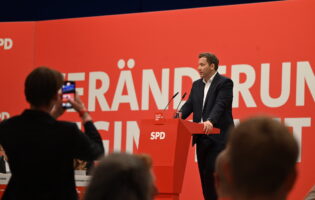
Harnessing the Power of Civil Society

Annika Frieberg
San Diego State University
Originally from Sweden, Annika Frieberg studied Modern and Central European History at the University of North Carolina-Chapel Hill. She teaches courses in 19th and 20th century European and East European history at San Diego State University. Her research and teaching interests center on war and genocide, gender, conflict resolution, media, national, and transnational questions in Central Europe. She has published several articles, including “Reconciliation Remembered. Early Activists and the Polish-German Relations” in Re-Mapping Polish-German Memory, which was published by Indiana University Press in 2011. She is the co-editor of Reconciling with the Past: Resources and Obstacles in a Global Perspective, published by Routledge in 2017. She is the author of Peace at All Costs: Catholic Intellectuals, Journalists, and Media in Postwar Polish-German Reconciliation, published by Berghahn Books in 2019.
She is a 2017-2018 participant in AICGS’ project “A German-American Dialogue of the Next Generation: Global Responsibility, Joint Engagement,” sponsored by the Transatlantik-Programm der Bundesrepublik Deutschland aus Mitteln des European Recovery Program (ERP) des Bundesministeriums für Wirtschaft und Energie (BMWi).
In 2012, the short documentary “Kony 2012” by the NGO Invisible Children created a social media blitz and massive public support for intervention against the warlord Joseph Kony in Uganda. Partially as a result of the public attention, the U.S. Senate passed a resolution to support the African Union in a military intervention against Kony. The group and film raises questions about the potential and the dangers of civil society involvement in foreign relations. Defined here as a sphere located between the family and the state, comprised of organizations and institutions representing the interests of citizens and existing outside the sphere of organized politics, civil society can become relevant to foreign relations and foreign policy in several important ways.
First, civil society groups can shape public opinion in order to pressure unwilling political leaders into rethinking their foreign policy. This happened in Polish-German relations in the 1950s, my research focus, and also more recently with “Kony 2012.” Second, civil society engagement can contribute to that which political scientist Yinan He calls “deep reconciliation,” an improvement of relations beyond top-down political diplomacy, engaging multiple societal groups and interests. Third, during times of political upheaval or in the case of fragile states, such as the late communist states in Eastern Europe, civil society support for improved relations can ensure continuity. The Polish-German relations project in the 1960s or 1970s outlived the fall of communism and the states that were the initial partners in the bilateral agreements. Finally, transnational or global civil society networks may draw on the so-called “boomerang effect” to change policy. Margaret E. Keck and Kathryn Sikkink’s Activists Beyond Borders: Advocacy Networks in International Politics explains by this term how advocacy groups can rely on transnational networks abroad to create foreign attention and pressure their home states toward political change.
Less positively, the story of “Kony 2012” also alerts us to the dangers of civil society involvement in foreign relations. Critics have argued that the young film-makers misrepresented the situation in Uganda. Their involvement meant that the analysis of Uganda and the decision-making process became transferred from specialists and insiders to African politics to well-meaning and engaged but largely ignorant outsiders. Today, groups such as Invisible Children can successfully use social media to garner attention for their causes. Euromaidan in Ukraine and “Kony 2012” are only a few examples of the explosive power of media-savvy groups and networks. Civil society engagement in connection with social media is therefore a double-edged sword as it might pressure decision-makers into abrupt decisions that undermine difficult compromises, diplomatic solutions, or long-term efforts. Civil society groups can also contribute to a deterioration in relations by reviving long-standing hostilities, spreading damaging rumors, influencing public opinion toward extreme solutions, or undermining trust among potential foreign partners. In this sense, non-state groups and organizations with highly developed social media skills are powers to harness as well as forces to fear in efforts toward peace and reconciliation.









